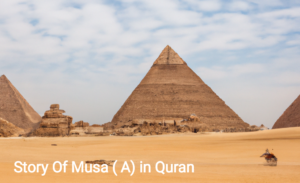Story of Musa ( As) in Quran

Musa (AS) is a prominent figure in Islamic history and is widely recognized as one of the greatest prophets of all time. His life story is mentioned in the Quran, and many scholars have written about it in their Tafsir works, including Ibn Kathir. In this article, we will discuss the life of Musa (AS) and the events that occurred during his prophethood, as recorded in the Quranic Tafsir of Ibn Kathir.
Musa (AS) was born during a time when the Pharaohs were in power in Egypt. The Pharaohs were known for their tyranny and oppression of the people. When Musa (AS) was born, the Pharaohs ordered the killing of all male infants born to the Israelites. Musa’s mother, fearing for her son’s life, put him in a basket and placed him in the river, hoping that someone would find him and take care of him. As fate would have it, the Pharaoh’s wife found the baby and took him in as her own. Thus, Musa (AS) grew up in the palace of the Pharaoh.
As Musa (AS) grew older, he became aware of the injustices and oppression that the Pharaohs were inflicting on the Israelites. One day, he saw an Egyptian soldier beating an Israelite, and Musa (AS) intervened and killed the soldier. Fearing for his life, Musa (AS) fled from Egypt and went to the land of Madyan.
In Madyan, Musa (AS) met a man named Shuaib, who was a prophet of Allah. Shuaib invited Musa (AS) to stay with him and helped him get a job as a shepherd. It was during this time that Musa (AS) received his prophethood from Allah. According to Ibn Kathir’s Tafsir, Musa (AS) was tending his flock when he saw a fire in the distance. As he approached the fire, he heard the voice of Allah calling to him. Allah told Musa (AS) that he was a prophet and that he had been chosen to lead the Israelites out of Egypt.
After receiving his prophethood, Musa (AS) returned to Egypt to deliver the message of Allah to the Pharaohs. He asked the Pharaohs to release the Israelites from slavery and to allow them to leave Egypt. However, the Pharaohs refused and instead increased their oppression of the Israelites. Allah then sent a series of miracles to prove to the Pharaohs that Musa (AS) was indeed a prophet of Allah.
One of the most famous miracles that Musa (AS) performed was the parting of the Red Sea. According to Ibn Kathir’s Tafsir, Musa (AS) and the Israelites were being pursued by the Pharaohs, and they found themselves trapped between the Red Sea and the Pharaoh’s army. Musa (AS) then struck his staff on the ground, and the Red Sea parted, allowing the Israelites to pass through safely. When the Pharaoh’s army attempted to follow, the sea closed in on them, drowning them all.
Another famous miracle that Musa (AS) performed was the turning of his staff into a snake. According to Ibn Kathir’s Tafsir, Musa (AS) was commanded by Allah to throw his staff on the ground, and it turned into a snake. Musa (AS) then picked up the snake by its tail, and it turned back into his staff.
Throughout his prophethood, Musa (AS) faced many challenges and hardships. The Pharaohs and their armies were constantly after him and the Israelites, and the Israelites themselves were not always cooperative or obedient. According to Ibn Kathir’s Tafsir, one such instance occurred when Musa (AS) went to Mount Sinai to receive the Ten Commandments from Allah. While Musa (AS) was away, the Israelites grew impatient and began worshipping a golden calf. When Musa (AS) returned and saw what they had done, he was furious and destroyed the calf.
Despite these challenges, Musa (AS) remained steadfast in his mission to deliver the message of Allah to the people. He continued to perform miracles and call the people to worship Allah alone. In the end, Allah granted Musa (AS) and the Israelites victory over the Pharaohs, and they were able to leave Egypt and journey to the land of Palestine.
Ibn Kathir’s Tafsir also provides insight into the teachings and guidance that Musa (AS) provided to the people. Musa (AS) emphasized the importance of following the commandments of Allah and living a righteous and just life. He also stressed the importance of helping those who were less fortunate and standing up against oppression and tyranny.
In conclusion, the story of Musa (AS) as recorded in the Quranic Tafsir of Ibn Kathir is a testament to the power of faith and the strength of the human spirit. Despite facing incredible challenges and hardships, Musa (AS) remained steadfast in his mission to deliver the message of Allah to the people. His story serves as an inspiration for all those who seek to follow the path of righteousness and strive for justice and peace in the world.
